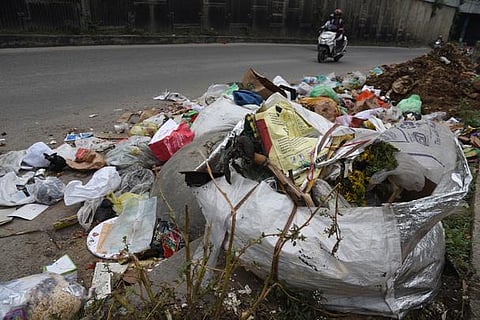

BENGALURU: There are very few stretches of roads in the city, where people can walk without holding their nose. This is because garbage management is a major problem in the city -- not just visual cleanliness but even its disposal. This is reflected in the recent Swachh Survekshan ranking, released by the Union Ministry of Housing and Urban Affairs. Bengaluru’s ranking slipped from 28 in 2021 to 43 in 2022 in the category of cities with over 10 lakh population.
Experts said that in the last decade, garbage management has not kept pace with the growth of the city. While the BBMP has set a target of 85 per cent for segregation of waste, only 42 per cent has been achieved. A National Green Tribunal expert committee too seems to have given up.
A civic expert, Ravindran B, said that the city, being a startup capital, has not explored the possibility of helping entrepreneurs by supplying them with adequate biodegradable waste generated at homes that could be converted into compost. If it is realised, a considerable amount of waste need not be sent to the landfills. For this, the BBMP has to make segregation mandatory, but it has not, partly because of garbage contractors who benefit from operating trucks to carry the waste. They don’t want segregation, he added.
According to BBMP records, the city generates 5,500-6,000 metric tonnes of waste every day. It has seven landfills and six waste-processing units (which have not been been upgraded since 2015). There are 150 dry waste collection centres, which can handle only one tonne of waste on an average. Nine decentralised biogas units have not been functioning since 2017. A company set up for solid waste management is yet to start operations.
A senior BBMP official said that nearly Rs 1,500 crore is spent on solid waste management every year. “Although BBMP tried to get a three-star rating in swachh ranking, it earned zero as it did not seem to process much waste,” he admitted.
A senior NGT official told The New Indian Express, “There is no political will to handle the issue. There are too many operators. The reason why Indore is No. 1 is because it takes all the responsibility. Here there are too many contractors, too many agencies and no one political head. Each official and contractor has its own interest. There is no awareness and people have no sense of ownership or belonging. Laws too are not being implemented strictly. The BBMP and government are yet to understand garbage generation, transportation and disposal.”
Activists said that despite the 73rd and 74th Amendments to the Constitution that mandates decentralisation in governance, administrators in Karnataka are obsessed with centralisation. This is reflected in the way solid waste is managed in the city. Centralisation favours corruption as contractors can fudge the number of trucks used to carry garbage. Besides, Bengaluru also has the additional burden of large amounts of electronic waste.